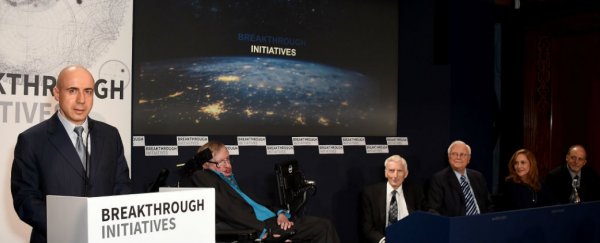Russian billionaire Yuri Milner and British astrophysicist Stephen Hawking have announced a US$100 million investment in the search for extraterrestrial life, which scientists at US-based research initiative, SETI, will spend over the next 10 years expanding the scope of their hunt for signs of intelligence deep in the cosmos.
"We believe that life arose spontaneously on Earth," Hawking said yesterday in London at a press conference launching SETI's new Breakthrough Listen initiative. "So in an infinite Universe, there must be other occurrences of life."
The funds couldn't have come at a better time for SETI (short for Search for Extraterrestrial Intelligence). Founded in 1960 by American astronomer and astrophysicist, Frank Drake, the research institute has endured a controversial lifespan, provoking the ire and ridicule of government representatives for decades until all federal funding was stripped from what is now a strictly private operation.
"Everyone lost their jobs. They weren't able to keep going in the field," Director of the Berkeley SETI Research Centre, Andrew Siemion, told John Wenz at Motherboard. "It also scared everyone. It scared grad students, it scared post-docs, it scared researchers. No one wants to be involved in research where your funding can be pulled at any moment."
Now encompassing several organisations, including the SETI Institute, the Berkeley SETI Research Centre, and SETI@home - a collective of 3 million alien hunting volunteers - SETI ended up with a whole lot of passionate researchers and scant resources to share among them. But all that's about to change with the $100 million Breakthrough Listen initiative.
"We would typically get 24 to 36 hours on a telescope per year, but now we'll have thousands of hours per year on the best instruments," one of the SETI founders, Andrew Siemion from the University of California, Berkeley, said at the press conference. "It's difficult to overstate how big this is. It's a revolution."
What does a revolution in astronomy look like? With Milner's funds, they'll now be able to collect as much data in a day as they have been in a year. While no one made any promises to actually come up with any evidence of intelligent life beyond our own, as Rachel Feltman points out at The Washington Post, "The likelihood of success is about to shoot up exponentially, because right now we're barely trying."
The team announced that it'll be kickstarting Breakthrough Listen by tuning into the 1,000 stars closest to Earth, trying to pick up any signs of "weak signals" being emitted in their vicinity.
"What they would indicate is not the galaxy-spanning megacivilisations, but rather, the civilisations that are just a few decades ahead of us on the technological time table," says Wenz at Motherboard. "It may be the way to resolve the Fermi Paradox (if there are alien civilisations out there, why haven't we heard from them?) by listening for them with much more sensitive ears."
A team of Australian researchers, led by Matthew Bailes from Swinburne University of Technology in Melbourne, will also be involved in the hunt. They're working to build a new supercomputer for the Parkes telescope, featured in the movie The Dish, as well as signal processing technology to help analyse radio signals picked up by the search.
"The petaflop signal processing system will use the latest technologies to harness the power of the huge radio spectrum available to us," said Bailes in a press release. "It will be possible to not only search for aliens, but also naturally-occurring astrophysical phenomena at the same time."
Rather impressively, the $100 million has all come straight from Milner's pocket. It's part of this much larger Breakthrough Prize Foundation, which awards the world's heftiest cash prize for science - US$3 million - to 18 science laureates in the fields of life science, mathematics, and physics each year. Apparently being an early investor in Facebook and Alibaba can make you a fairly decent living.
"I've been thinking about this since I was a child, reading Carl Sagan's book Intelligent Life in the Universe," Milner told The Washington Post. "The year that I was born, 1961, that was a big year in science - the first man was launched into space, and I was named for him. And Kennedy made his famous speech about putting man on the Moon."
Milner says he doesn't have high expectations that the project will turn up anything concrete, but says the search itself will be invaluable to science. We can't wait to see what SETI will find. Aliens or not, we're in for some truly awesome discoveries.
